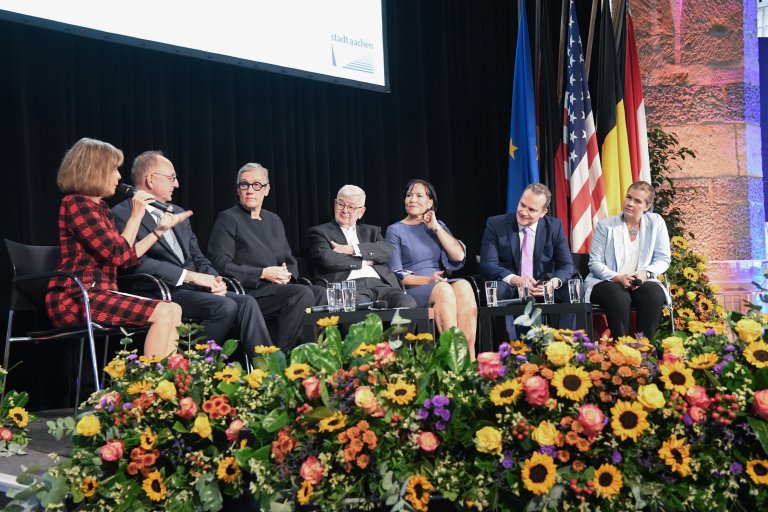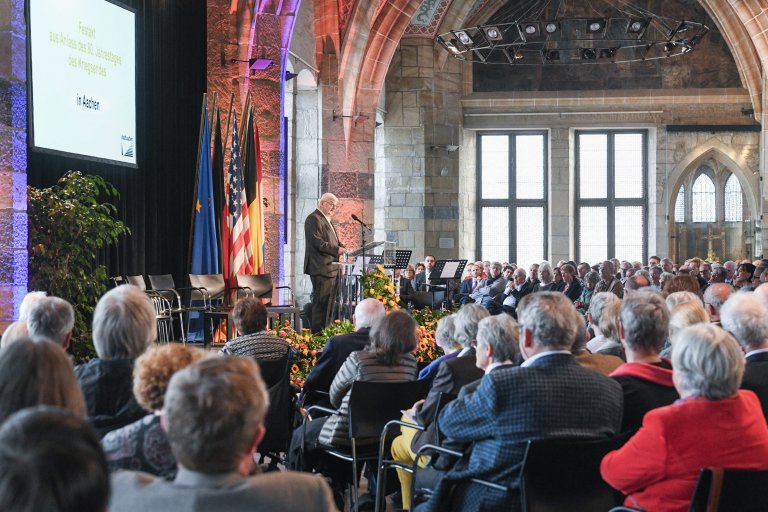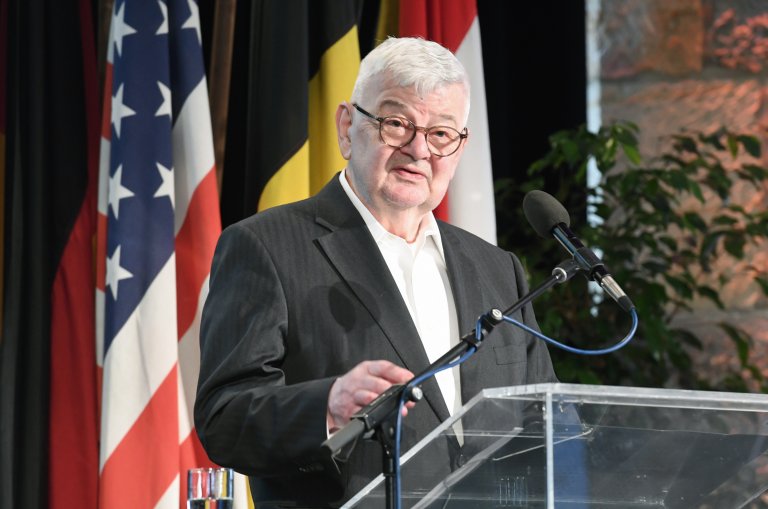80 years since the end of the war: Aachen celebrates liberation - Keynote speaker Joschka Fischer warns of new threats
- Aachen celebrated the 80th anniversary of its liberation by the Allies on Sunday.
- Following a review of the war period, Aachen's Lord Mayor Sibylle Keupen made an appeal for peace and democracy.
- Former German Foreign Minister Joschka Fischer warned urgently of new dangers and emphasized the importance of European cohesion.
When the short black and white film flickered across the screens in the Coronation Hall of Aachen City Hall at the beginning of the ceremony, the contrast was almost tangible for a moment: Mountains of rubble, burnt-out buildings - and then Aachen's damaged town hall. The extent of the destruction caused by the Second World War was impressively evident even in the blurred images.
Today, around 80 years later, there are few reminders of the former destruction in the town hall. Yesterday, Sunday, October 13, 2024, Aachen celebrated the 80th anniversary of its liberation by the Allies with a ceremony in the Coronation Hall of the Town Hall. Numerous guests from the region, neighboring countries and twin cities came to look back together and emphasize the importance of peace and democracy. The keynote speaker was former German Foreign Minister Joschka Fischer. His speech was a cautionary reminder of how fragile peace and freedom are and what responsibility Europe and Germany bear for preserving them.
But let's start again: on October 21, 1944, the horrors of war came to an end for Aachen. After intense fighting, Aachen was the first major German city to be liberated by the Allies. The city, as the black-and-white film also showed, was badly damaged by the ongoing fighting: only 6,000 Aacheners were still living in the city at the time of liberation, tens of thousands of houses had been destroyed, three million cubic meters of rubble were scattered around and only six bricklayers and three carpenters remained. Many of the residents suffered under the weeks-long siege.
The surrender of the German Wehrmacht marked the beginning of liberation from the National Socialist terror regime and laid the foundations for a new beginning. A new beginning on which the freedom and democracy of Germany and Europe are still based today. Mayor Sibylle Keupen also emphasized this. In her welcoming address, she began by describing the dark final days of the war, during which people sought shelter in bunkers: "The wounds were deep and the losses heavy. The scars of destruction left their mark on the people who lived here - even my mother-in-law sat in the bunker in Paulinenwäldchen as a 12-year-old girl, terrified," she said. This is another reason why the reconstruction was so challenging. It was ultimately successful with the help of the Americans and the hope that was rekindled in the population with the liberation. "American soldiers and civilian helpers, supported by the courageous citizens of our city, laid the foundations for the democratic society in which we live today." Aachen has thus become a symbol of reconstruction, a new beginning and the shaping of a democratic future and is today a city of peace, culture and understanding. However, these very values are not only increasingly being called into question again, but actively attacked. Keupen therefore appealed to all guests at the end of her speech: "Let us not only celebrate today, but also make a commitment. A commitment to stand up for what generations before us have fought for. Let us continue to work for the freedom and democracy that are so vividly embodied within these walls."
In contrast, Joschka Fischer's subsequent speech was surprisingly sober. As a former German Foreign Minister and visiting professor at Princeton University in the US, he would surely have prepared a few confident words, announced Aachen-based journalist and presenter Gisela Steinhauer, who was more questioning than telling.
But things turned out differently. The former Green politician painted a critical picture of the current political situation in Europe and warned urgently against the return of nationalist tendencies that threaten unity and democracy. "In view of Europe's historical experience with nationalism, its return to power would be nothing less than a catastrophe," he said, quoting former French President François Mitterrand: "Nationalism is war." Europe's attitude in the defense of Ukraine will show whether European unity and the values that have been built up over the past decades are strong enough. "Now is the time to decide whether European unity will endure. The war in Ukraine is a touchstone for the future of our common values and our will to stand up for these values." The ties to the West, which Konrad Adenauer championed after the Second World War, are once again under threat today and it is up to the current generation to defend this legacy.
It was then up to the concluding panel discussion to once again take a confident look into the future and emphasize the importance of cooperation and international understanding. Oliver Paasch, Minister President of the German-speaking Community of Belgium, and Elianne Demollin-Schneiders, Minister of the Dutch province of Limburg, reported on the transformation of former enmities into close friendships and emphasized that the border triangle is a role model for successful cross-border cooperation today. Katharina Eckstein from the German War Graves Commission described how young people can also be inspired to commit themselves to peace, and Takis P. Karantonis, Deputy Mayor of Arlington, emphasized the close ties between Aachen and the American twin city.
The Aachen Symphony Orchestra, conducted by General Music Director Christopher Ward, provided the musical framework for the ceremony. At the end of Fischer's speech, the musicians played Beethoven's "European Anthem", underlining the hope for a united Europe. The ceremony was thus not only a reminder of the past, but also a powerful appeal to everyone to actively work towards a peaceful, shared future.
Numerous other events are planned to mark the 80th anniversary of liberation. Further information on the supporting program can be found at: www.aachen.de/DE/kultur_freizeit/kultur/geschichte/aachen1944.
You can subscribe to our RSS feed for our press releases here https://www.aachen.de/rss-feed-pressemitteilungen/rss.xml



